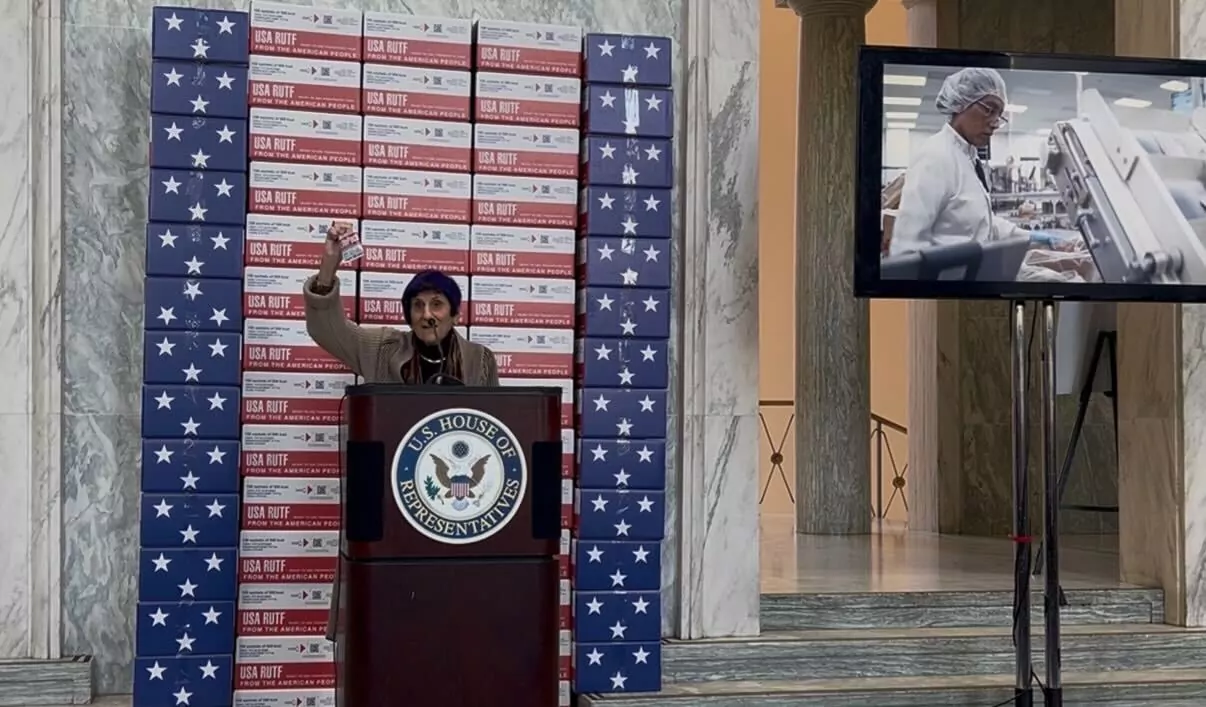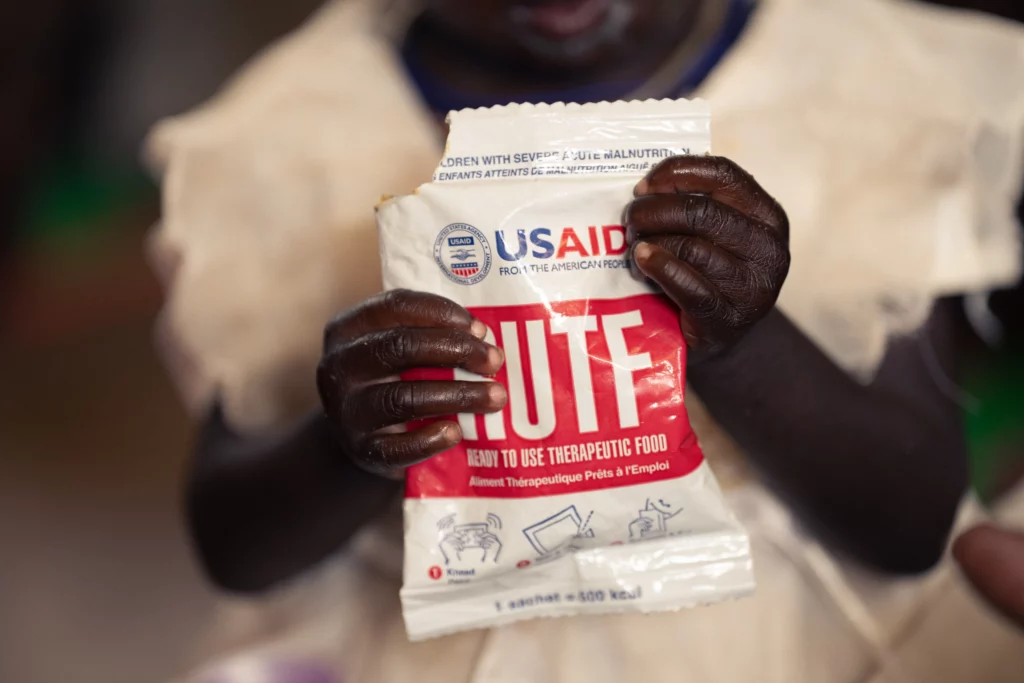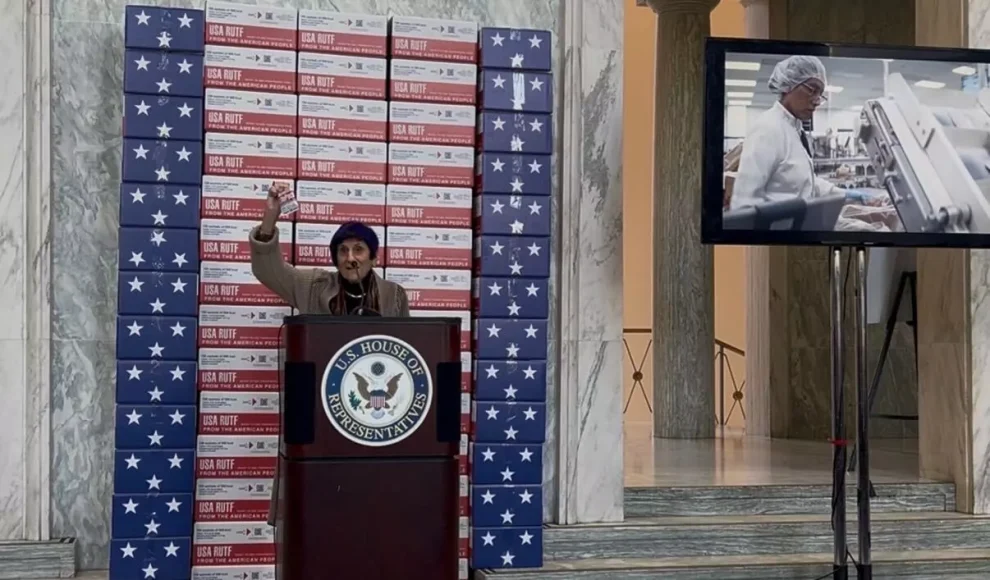EXCLUSIVE — Groups that feed malnourished children abroad with edible paste are asking a divided Congress to make their program a bipartisan priority after freezes in funding for the U.S. Agency for International Development threaten their existence.
Two U.S.-based companies that manufacture the nutrient-dense paste, MANA Nutrition and Edesia Nutrition, and a non-profit supporting them, the Eleanor Crook Foundation, are imploring both House lawmakers and the Trump administration to reinstate funding for ready-to-use therapeutic food, or RUTF, as the Department of Government Efficiency reviews their contracts to produce and send food to foreign countries for children at risk of starvation.
RAND PAUL INTRODUCES NEW BILL TO ‘FIGHT HUNGER AND IMPROVE NUTRITION’
Freezes from USAID have manufacturers like MANA stuck in limbo, as they stare down the possibility that the federal government will no longer contract their organization to produce the life-saving nutritional packets produced from peanuts, soy, sugar, and other American-grown ingredients.
And the biggest blocs harmed by the pauses in funding are the farmers and factory workers, MANA leadership told the Washington Examiner at an event at the Capitol Tuesday evening to connect food manufacturers with lawmakers who could help them.
“So the money for American food aid doesn’t leave the United States,” MANA CEO Mark Moore said. “It goes to those farmers.”

RUTF products support farmers
RUTF production spans 27 states, red and blue, and support for the product has been a bipartisan issue. The product has saved over 12 million lives since it was invented 20 years ago, per the Eleanor Crook Foundation. Organizations advocate a $1.7 billion investment to reduce child deaths by 20%.
Many GOP lawmakers told the Washington Examiner that they support DOGE’s efforts to cut waste, fraud, and abuse, but they believe USAID funding for RUTF should be reinstated.
Rep. Buddy Carter (R-GA) represents Georgia, MANA’s primary operation location and a state that will be one of the hardest hit by a lack of funding. He said he’s been in touch with the Trump administration to find a path forward to reinstatement.
“While I support the work of DOGE, this is a good American-made project that is saving children’s lives,” Carter said in a statement. “It’s an appropriate use of taxpayer dollars and should be protected.”
Rep. Austin Scott (R-GA) called MANA an “incredible mission-driven organization that saves lives across the globe.”
“I can attest to their significant community impact in Georgia’s 8th Congressional District and their commitment to ending child malnutrition,” Scott said in a statement to the Washington Examiner. “The administration is working to ensure that all U.S. foreign assistance aligns with our national security interests and global mission.”
A spokesperson for Rep. Ashley Hinson (R-IA), whose state produces soy for RUTF, said the congresswoman wants to “support strong partnerships between American farmers and those in need” and supports President Donald Trump’s mission to “restore fairness for producers in the global marketplace.”
On the Democratic side, lawmakers have been pushing the narrative that funding to save children’s lives should not be political — and they need outside groups to keep fighting.
“You all know in this room that the Congress is an institution that responds to external pressure,” Appropriations Committee ranking member Rosa DeLauro (D-CT) told attendees. “You are that external pressure. Now is the time to say, ‘No, fight back. We’re not going to take away the resources of these organizations and the agencies that provide the ability to save lives.’”
Rep. Gabe Amo (D-RI), who represents the state where Edesia is based, told the Washington Examiner he thinks Congress needs to take the lead and “raise the alarm” that dismantling funding for RUTF “hurts our standing in the world.”
“I think raising that alarm, both for Americans in self-interest and also for the values that we have held in a bipartisan way for a long time … the nutrition aid is paramount,” Amo said.
“It keeps our nation safe in the long term because what it does is it pushes back China and their attempts to continue to expand and exert their influence around the world,” the Democrat added.

USAID funding freeze places nutrition production groups in ‘wildly unhelpful’ limbo
Efforts to fund RUTF have come from both sides of the aisle. Amo sent a letter to the State Department in July 2024 in support of “dedicated funding” to RUTF under the $9 billion approved in humanitarian assistance under the fiscal year 2024 appropriations process.
Rep. Mario Diaz-Balart (R-FL), chairman of the State, Foreign Operations, and Related Programs Appropriations Subcommittee, prioritized $300 million in funding in the fiscal 2025 bill to boost RUTF funding to combat malnutrition.
Freezes in USAID funding amounted to nearly 5,800 awards being terminated and more than 500 retained — the latter amounting to approximately $57 billion, per a February court filing. For many years, USAID has been a top supporter and funder of RUTF products.
In January, Moore said MANA received word the company’s contracts with USAID were paused, as Elon Musk and his team swept in and dismantled the agency. In February, the contracts were canceled, but MANA kept producing after Moore said lawmakers in production states told them to keep going with the hope that funding would be back online soon.
“It’s wildly unhelpful, obviously, as a producer, to have to stop like that and have to start and crank it back up again,” Moore said, noting that he doesn’t think DOGE means to be “intentionally cruel” but the lack of communication from the administration is “unhelpful” as there are no more USAID counterparts to contact.
David Todd Harman, chief operations officer of MANA, told the Washington Examiner that the final contract between USAID and the organization will be completed in June. After that, there is no clarity on what comes next.
George Birdsong, CEO of Birdsong Peanuts, told the Washington Examiner that any pause in funding is a blow to the growers and shellers like his company. He hasn’t suffered any hits to his business “other than mentally.”
“We want the product to be used for the benefit of the children around the world,” Birdsong said.
Layoffs impacting MANA’s 120 factory employees will be likely if there is no insight from the federal government by Jan. 1, 2026, Harman said. The company just got payments last week for orders due last year or earlier this year, he said, causing some doubt among RUTF producers that the complications with funding will resolve themselves soon.
“So immediately it goes to is, what does this mean for [factory employees] and their families? And even when you have some reassurance about a way forward, it’s trying to make sure those folks are up to speed and trust that you know what you’re talking about,” Harman told the Washington Examiner.
Those reassurances come in the form of other groups’ support. Navyn Salem, CEO of Edesia, told the Washington Examiner that her organization and MANA combined forces after the funding freezes.
“We’re advocating for the same one, important, collective mission of ending malnutrition,” Salem said. “And so it’s a lot of pain to go through, but I strongly believe that on the flip side, we’ll have a lot of positive outcomes, which there’s even an opportunity to be able to reach more children.”
Salem, who already had to lay off 10% of her staff due to the freezes, said part of her work now is to educate lawmakers and other advocacy groups and push for transparency from the administration about the fate of funding.
“In times like this that are so polarizing, this is something that we can get behind that is positive and productive in terms of continuing the goodwill around the world,” Salem added.
Todd Harman praised the Eleanor Crook Foundation, a smaller contributor to MANA, for its advocacy work, calling the effort to reinstate USAID funding “a team sport.” Will Moore, CEO of the foundation, debuted the name “life packs” at the Washington, D.C., event, hoping the catchy term and “America First” branding would push the White House and Congress to back their cause.
“This is the legacy we and the Trump administration can build together: by fully funding and producing scaling up distribution of life packs with this new and improved ‘America First’ branding for all children in need,” Will Moore said.
Harman admitted that USAID has become such an integral part of RUTF production that the way forward for helping starving children remains unclear.
“We’ve been heavily relying on USAID — part of that has been because of USAID’s appetite for these products has been so great, it’s taken most of our capacity,” Harman said.
USDA CALLS FOR GREATER ACCOUNTABILITY IN SNAP DELAYS
“Exiting is going to be detrimental, but especially for U.S. manufacturers,” Harman added. “That’s — the two of us are going to be left to make up a really big part of our portfolio with other customers that we’ve kind of purposely kept at arm’s length to supply the huge leads coming out of U.S. government.”
The Washington Examiner reached out to the State Department for comment.
























